Toyota Motor Bundle
What Drives Toyota's Global Success?
Explore the foundational principles that have propelled Toyota Motor Corporation to the forefront of the automotive industry. Uncover the Toyota Motor SWOT Analysis and delve into the company's guiding mission, ambitious vision, and deeply ingrained core values.
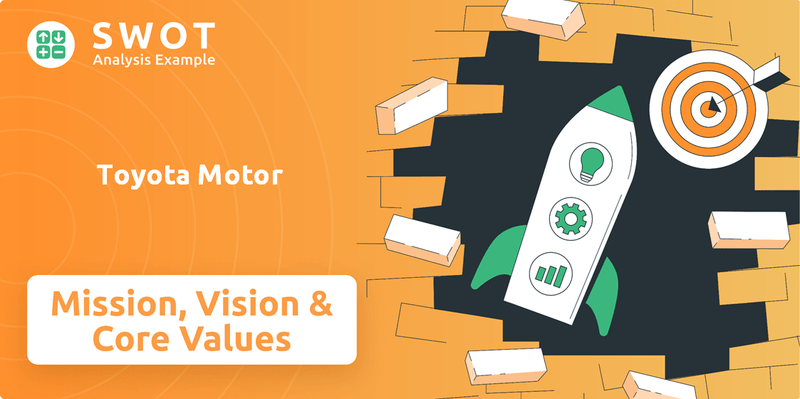
Understanding the Toyota mission, Toyota vision, and Toyota core values offers a window into the company's strategic approach and its commitment to innovation and sustainability. These elements, forming the Toyota philosophy, are not just statements but the very essence of how Toyota company operates, influencing everything from product development to customer relations. Discover how Toyota principles shape its global presence and drive its response to the evolving demands of the automotive market.
Key Takeaways
- Toyota's mission, vision, and values are central to its global automotive leadership.
- Focus on quality, mobility, and continuous improvement are key to Toyota's enduring success.
- Adapting to electrification and autonomous driving requires consistent adherence to core principles.
- Toyota's vision emphasizes innovation and environmental respect for future relevance.
- The company's purpose extends to shaping the future of mobility for a sustainable society.
Mission: What is Toyota Motor Mission Statement?
Toyota's mission is 'To make ever-better cars, to build a future where everyone has the freedom to move.'
Let's delve into the core of Toyota's operational philosophy by examining its mission statement.
The Toyota mission statement encapsulates the company's fundamental purpose. It's a dual commitment: to enhance its products continuously and to broaden the scope of mobility. This mission guides Toyota's strategic decisions, from product development to global expansion.
The phrase "make ever-better cars" highlights Toyota's dedication to quality and innovation. This commitment is evident in their consistent high rankings in reliability surveys and their ongoing investment in research and development. Toyota's relentless pursuit of improvement is a cornerstone of its success.
The second part of the mission, "to build a future where everyone has the freedom to move," reflects Toyota's broader societal goals. This includes not only producing cars but also investing in diverse mobility solutions. This vision extends beyond traditional car ownership.
The Toyota company strongly focuses on its customers. The mission statement's emphasis on "everyone" indicates a broad target audience. Toyota aims to provide value and positive experiences through its products and services, ensuring customer satisfaction.
The mission statement has a strong societal orientation. Toyota is committed to enhancing the freedom of movement and contributing to a better future. This includes environmental sustainability, with significant investments in hybrid and electric vehicle technologies.
Toyota’s mission is reflected in its actions. The Toyota Production System (TPS) is a prime example, focusing on efficiency and quality. Their diverse vehicle range, including the Prius, which has sold over 5 million units globally as of late 2024, shows their commitment to various customer needs. Furthermore, initiatives like the e-Palette demonstrate their vision for future mobility. For further insights, you can explore the perspectives of Owners & Shareholders of Toyota Motor.
The Toyota mission statement provides a clear framework for the company's operations, driving both product innovation and a broader societal impact. Understanding this mission is key to grasping Toyota's long-term strategy and its role in the automotive industry. The Toyota vision is closely tied to its mission, shaping its future endeavors. Furthermore, the Toyota core values underpin the mission, guiding the company's culture and operations.
Toyota Motor SWOT Analysis
- Complete SWOT Breakdown
- Fully Customizable
- Editable in Excel & Word
- Professional Formatting
- Investor-Ready Format
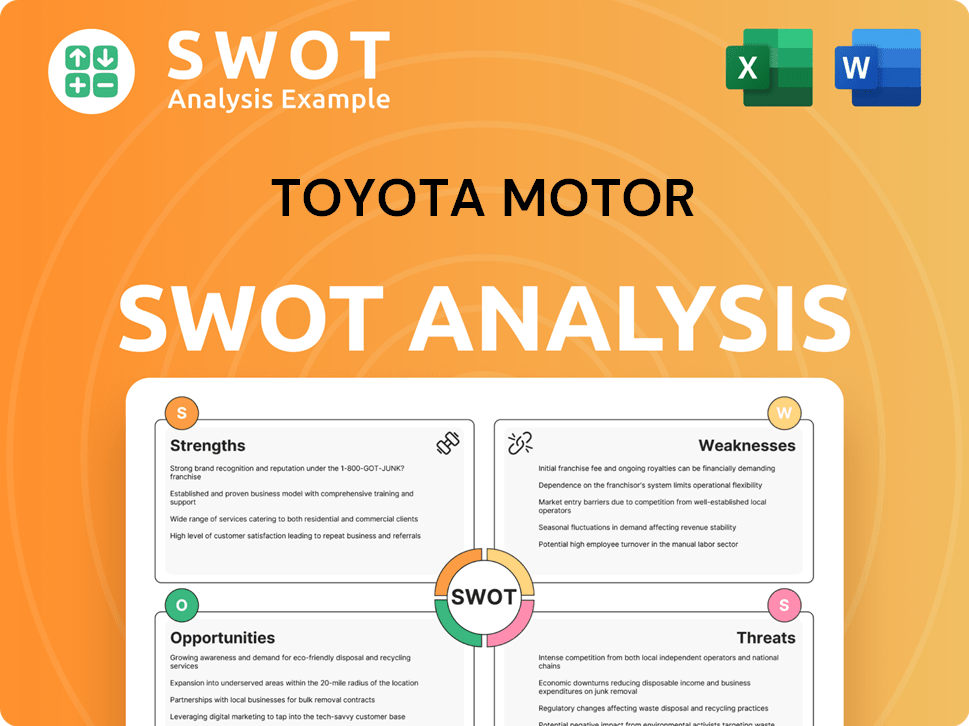
Vision: What is Toyota Motor Vision Statement?
Toyota's vision is "to lead the future mobility society, enriching lives around the world with the safest and most responsible ways of moving people. Through our commitment to quality, ceaseless innovation, and respect for the planet, we strive to exceed expectations and be rewarded with a smile. We will meet challenging goals by engaging the talent and passion of people who believe there is always a better way."
Let's delve into the specifics of Toyota's vision statement and what it means for the future of the Toyota company.
The Toyota vision is explicitly future-focused, centering on the "future mobility society." This signals a proactive approach to the evolving automotive landscape. Toyota aims to be at the forefront of changes, including electrification, autonomous driving, and sustainable transportation.
The vision's global reach, aiming to enrich lives "around the world," highlights Toyota's commitment to international markets. This global perspective is crucial, considering Toyota's widespread presence and sales across numerous countries. In fiscal year 2024, Toyota's global sales reached approximately 11.09 million vehicles.
The vision emphasizes core areas: safety, responsibility, quality, innovation, and environmental respect. These are critical for Toyota's mission and its long-term success. The company's dedication to these areas is reflected in its product development, manufacturing processes, and corporate social responsibility initiatives.
The vision's emphasis on "quality" and "ceaseless innovation" underscores Toyota's dedication to excellence. Toyota consistently invests heavily in research and development. In fiscal year 2024, R&D spending reached 1.16 trillion yen (approximately $7.9 billion USD), demonstrating its commitment to technological advancements.
Respect for the planet is a key element of Toyota's vision, reflecting the growing importance of sustainability. Toyota is actively involved in developing hybrid and electric vehicles. The company has set ambitious goals for reducing carbon emissions, aligning with global efforts to combat climate change. This is a critical part of understanding Toyota's principles.
The vision's final part emphasizes engaging talent and passion, highlighting Toyota's belief in continuous improvement. This reflects the company's culture of empowering employees to find "a better way." This focus on employee engagement is crucial for driving innovation and achieving its goals, as highlighted in Mission, Vision & Core Values of Toyota Motor.
In summary, Toyota's vision statement provides a clear roadmap for the company's future, emphasizing its commitment to innovation, sustainability, and global impact. It reflects Toyota's philosophy of striving for excellence and contributing to a better world.
Toyota Motor PESTLE Analysis
- Covers All 6 PESTLE Categories
- No Research Needed – Save Hours of Work
- Built by Experts, Trusted by Consultants
- Instant Download, Ready to Use
- 100% Editable, Fully Customizable
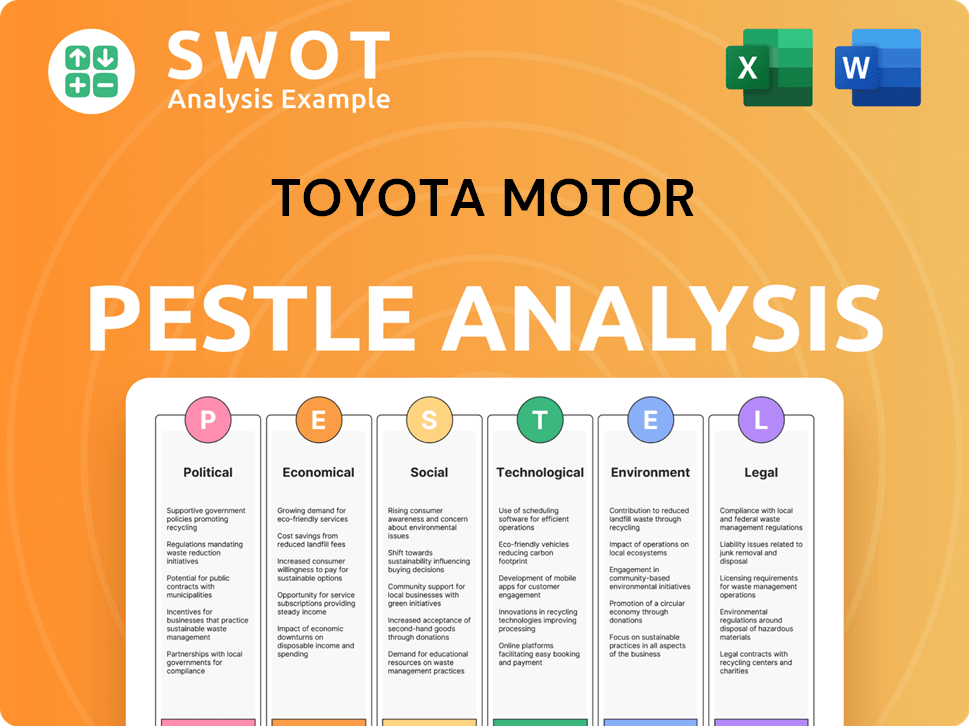
Values: What is Toyota Motor Core Values Statement?
The enduring success of Toyota Motor Company is significantly shaped by its deeply ingrained core values, which guide its operations and interactions. These values, often encapsulated in "The Toyota Way" and the "Toyoda Principles," are fundamental to the company's culture and strategic direction, influencing every aspect of its business.
Respect for People is a cornerstone of the Toyota philosophy, emphasizing the value of every individual within the company and in its interactions with the world. This value is evident in Toyota's commitment to diversity and inclusion programs, employee training, and fostering a workplace where diverse perspectives are encouraged. For example, in 2024, Toyota invested over $500 million in employee training and development programs globally, reflecting its commitment to its workforce.
Kaizen, or continuous improvement, is a driving force behind Toyota's relentless pursuit of excellence in all areas. This principle is integral to Toyota's lean manufacturing principles, which aim to eliminate waste and enhance efficiency. In 2024, these efforts contributed to a 15% reduction in manufacturing waste and a 10% improvement in production efficiency, demonstrating the tangible impact of Kaizen.
Toyota encourages its employees to challenge the status quo and seek innovative solutions, fostering a culture of continuous learning and adaptation. This value is crucial for staying ahead in the rapidly evolving automotive industry, especially in areas like electrification and autonomous driving. Toyota's investment in R&D reached $9.8 billion in 2024, reflecting its commitment to challenging existing technologies and developing new ones.
Genchi Genbutsu emphasizes the importance of firsthand observation and understanding of situations. This principle encourages employees, particularly leaders, to spend time on the factory floor or at dealerships to gain direct knowledge and identify problems or opportunities. This ensures that decisions are based on real-world insights, contributing to the company's ability to adapt and innovate. This approach has helped Toyota maintain its strong position in a competitive market, as highlighted in an analysis of the Competitors Landscape of Toyota Motor.
These core values of Toyota Motor are not merely statements; they are the foundation upon which the company builds its culture, drives its operations, and shapes its interactions with stakeholders. Understanding these values is crucial for grasping the essence of the Toyota company and its approach to the automotive industry. The next chapter will explore how Toyota's mission and Toyota vision influence the company's strategic decisions.
How Mission & Vision Influence Toyota Motor Business?
Toyota's unwavering commitment to its mission and vision significantly shapes its strategic decisions, driving innovation and guiding its actions across all facets of its business. These guiding principles are not merely statements; they are the foundation upon which Toyota builds its future.
Toyota's aggressive push towards electrification directly reflects its mission to 'make ever-better cars, to build a future where everyone has the freedom to move' and its vision to 'lead the future mobility society'. This strategic shift is a core component of their long-term planning.
- Investment in a diverse range of electrified vehicles: Hybrids, plug-in hybrids, battery electric vehicles (BEVs), and fuel cell electric vehicles.
- Aim to launch multiple new electric vehicle models by 2026.
- Target of 1.5 million annual BEV sales.
- This strategic move supports a sustainable mobility future.
The vision of providing the 'safest and most responsible ways of moving people' translates into the development of advanced driver-assistance systems (ADAS) and autonomous driving technologies. The Toyota mission emphasizes creating happiness through mobility, and safety is a key element of this.
Toyota's exploration of mobility solutions beyond traditional car ownership, such as the e-Palette, demonstrates its commitment to enabling freedom of movement for everyone. This diversification is a direct response to the evolving mobility landscape, aligned with their Toyota vision of leading the future mobility society.
In fiscal year 2024, Toyota reported revenues of 37.78 trillion yen (approximately $257 billion USD), showcasing their strong market position. This financial success allows for continued investment in future initiatives, demonstrating the effectiveness of their strategic alignment with their Toyota core values.
Guided by its mission and values, Toyota's continued focus on quality and innovation contributes to its sustained success and competitive advantage. This commitment to excellence is a cornerstone of the Toyota company's strategy.
Toyota's strategic decisions, driven by its mission and vision, have a significant impact on the entire automotive industry. Their focus on sustainable mobility and advanced technologies sets a benchmark for other manufacturers. The company's Toyota principles are evident in their approach to product development and market expansion.
Toyota's global presence and market leadership are a direct result of its adherence to its mission, vision, and core values. Their commitment to customer satisfaction, quality, and innovation has solidified their position as a leading automotive manufacturer worldwide. Understanding the Target Market of Toyota Motor is crucial for appreciating their strategic choices.
In essence, Toyota's mission and vision are not just words; they are the driving force behind its strategic decisions, shaping its product development, market expansion, and overall success. The company's unwavering commitment to these principles ensures its continued relevance and leadership in the evolving automotive landscape. Let's delve into the next chapter to explore the Core Improvements to the Company's Mission and Vision.
Toyota Motor Business Model Canvas
- Complete 9-Block Business Model Canvas
- Effortlessly Communicate Your Business Strategy
- Investor-Ready BMC Format
- 100% Editable and Customizable
- Clear and Structured Layout
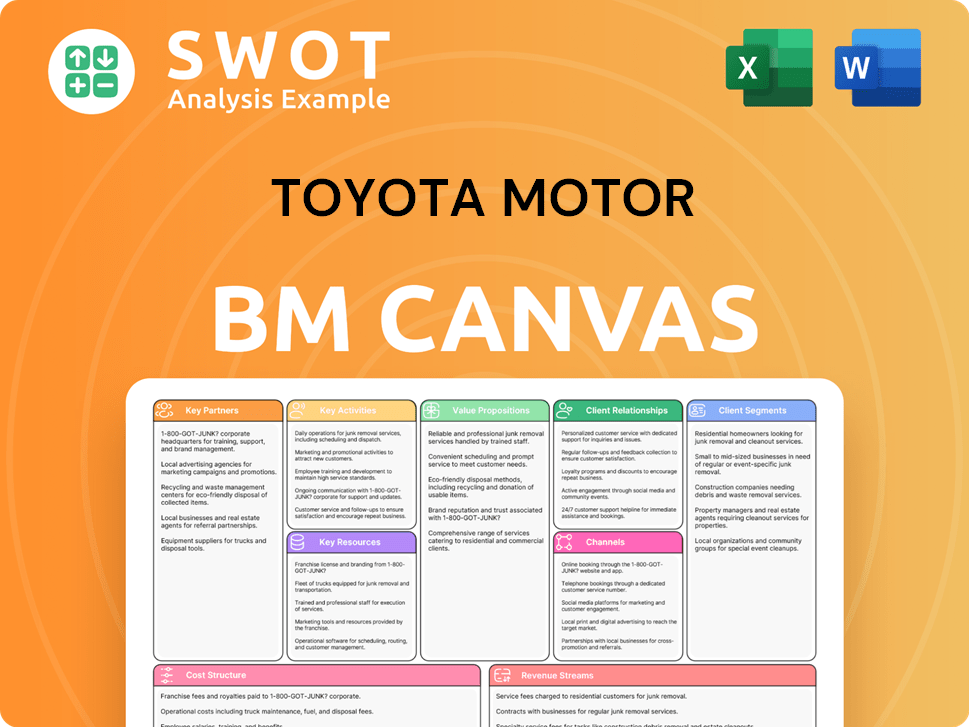
What Are Mission & Vision Improvements?
While Toyota's foundational statements have served the company well, adapting them to reflect current trends can further solidify its leadership. These refinements focus on enhancing the articulation of sustainability, integrated mobility, and technological innovation within their core principles.
To strengthen the 'Toyota mission,' explicitly incorporating environmental sustainability within the 'make ever-better cars' component is crucial. This would signal a deeper commitment to eco-friendly practices, aligning with growing consumer demand for sustainable products. For example, Toyota could emphasize reducing carbon emissions throughout the vehicle lifecycle, from production to end-of-life, and promoting the use of recycled materials. This aligns with the increasing importance of Environmental, Social, and Governance (ESG) factors, which influence investment decisions; in 2024, ESG-focused assets reached approximately $40.5 trillion globally, demonstrating the significance of sustainability in business strategies.
The 'Toyota vision' could be enhanced by explicitly mentioning their role in developing integrated mobility ecosystems, not just vehicles. This would reflect the evolving landscape of transportation, which includes connectivity, data, and various modes of transport. Highlighting the company's ambition to lead in this broader ecosystem, including autonomous driving, shared mobility services, and smart city integration, would position Toyota as a forward-thinking innovator. This is particularly relevant as the global market for smart mobility solutions is projected to reach $1.3 trillion by 2030, underscoring the need for a comprehensive vision.
To better reflect the future of the automotive industry, Toyota's core values could be updated to explicitly address technological innovation. This could involve emphasizing continuous improvement in areas like software development, data analytics, and artificial intelligence, which are increasingly critical to the success of modern vehicles. This is crucial, given that the automotive software market is expected to reach $100 billion by 2028, highlighting the importance of technological advancement in the Revenue Streams & Business Model of Toyota Motor.
Toyota could reinforce its commitment to the circular economy within its core values and mission. This means emphasizing the importance of resource efficiency, waste reduction, and the use of recycled materials. By explicitly integrating these principles, Toyota can demonstrate its dedication to sustainable practices and appeal to environmentally conscious consumers. This approach is becoming increasingly important, with the circular economy expected to generate $4.5 trillion in economic value by 2030.
How Does Toyota Motor Implement Corporate Strategy?
Toyota's success is deeply rooted in its ability to translate its mission, vision, and core values into tangible actions and a thriving corporate culture. This implementation is a continuous process, ensuring that the company's guiding principles remain at the forefront of its operations and strategic decision-making.
Leadership plays a pivotal role in implementing the Toyota mission, Toyota vision, and Toyota core values. Executives lead by example, consistently communicating the importance of "The Toyota Way" throughout the organization.
- Leaders actively promote and embody the Toyota principles, ensuring they are integrated into daily operations.
- Regular communication and training programs reinforce the company's values at all levels.
- Emphasis on aligning stated values with actual business practices fosters trust and accountability.
- Employees are encouraged to voice concerns if discrepancies arise, promoting transparency.
Toyota's commitment to its Toyota vision is evident in its strategic initiatives, such as the development and launch of the bZ (Beyond Zero) series of electric vehicles. This directly aligns with their vision of leading the future mobility society and their commitment to respecting the planet.
Toyota's investments in hydrogen fuel cell technology and other alternative fuels further showcase its dedication to providing responsible mobility options. The company has invested billions in fuel cell technology. For example, in 2023, Toyota announced a partnership to expand hydrogen infrastructure in California, with a planned investment of $1.2 billion.
The Toyota Production System (TPS) is a prime example of how the Toyota core values, particularly continuous improvement and respect for people, are embedded in their operations. TPS empowers employees to identify and implement improvements, fostering a culture of efficiency and quality.
Communication of the Toyota mission, Toyota vision, and Toyota core values is done through various channels. These include internal training programs, corporate literature, and leadership messaging.
Formal programs and systems, such as quality control standards implemented at each production base, ensure alignment with their commitment to providing safe and high-quality products. Toyota's commitment to quality is reflected in its consistently high ratings in customer satisfaction surveys.
- Toyota has consistently ranked among the top automakers in quality and reliability surveys.
- The company invests heavily in research and development to maintain its competitive edge.
- Toyota's global presence is a testament to its successful implementation of its values. If you want to learn more, you can explore the Marketing Strategy of Toyota Motor.
Toyota Motor Porter's Five Forces Analysis
- Covers All 5 Competitive Forces in Detail
- Structured for Consultants, Students, and Founders
- 100% Editable in Microsoft Word & Excel
- Instant Digital Download – Use Immediately
- Compatible with Mac & PC – Fully Unlocked
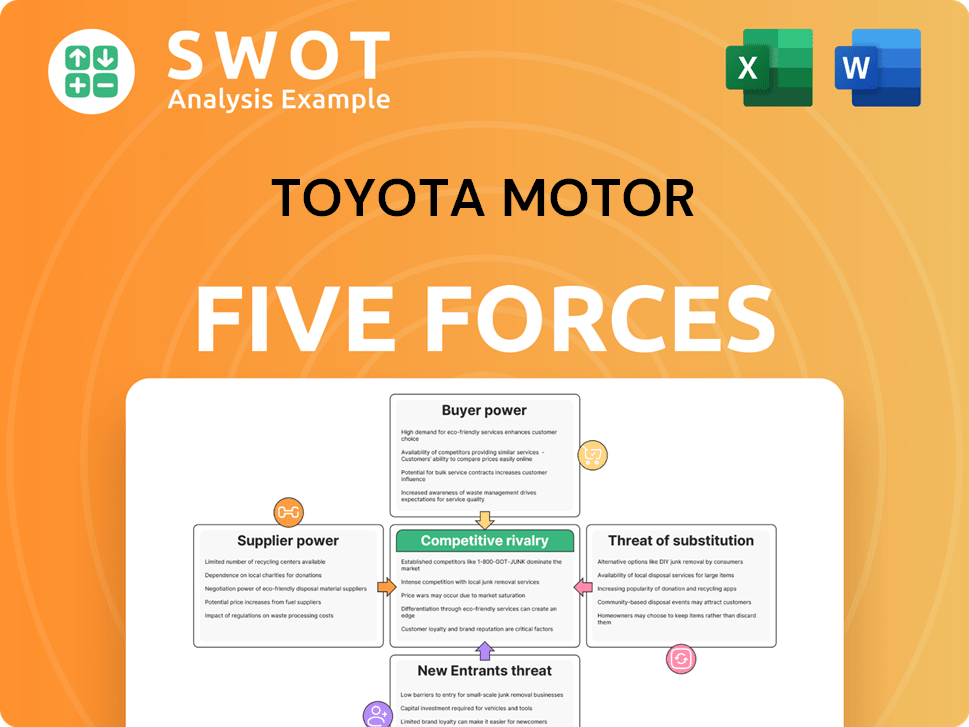
Related Blogs
- What are Mission Vision & Core Values of Toyota Motor Company?
- What is Competitive Landscape of Toyota Motor Company?
- What is Growth Strategy and Future Prospects of Toyota Motor Company?
- How Does Toyota Motor Company Work?
- What is Sales and Marketing Strategy of Toyota Motor Company?
- Who Owns Toyota Motor Company?
- What is Customer Demographics and Target Market of Toyota Motor Company?
Disclaimer
All information, articles, and product details provided on this website are for general informational and educational purposes only. We do not claim any ownership over, nor do we intend to infringe upon, any trademarks, copyrights, logos, brand names, or other intellectual property mentioned or depicted on this site. Such intellectual property remains the property of its respective owners, and any references here are made solely for identification or informational purposes, without implying any affiliation, endorsement, or partnership.
We make no representations or warranties, express or implied, regarding the accuracy, completeness, or suitability of any content or products presented. Nothing on this website should be construed as legal, tax, investment, financial, medical, or other professional advice. In addition, no part of this site—including articles or product references—constitutes a solicitation, recommendation, endorsement, advertisement, or offer to buy or sell any securities, franchises, or other financial instruments, particularly in jurisdictions where such activity would be unlawful.
All content is of a general nature and may not address the specific circumstances of any individual or entity. It is not a substitute for professional advice or services. Any actions you take based on the information provided here are strictly at your own risk. You accept full responsibility for any decisions or outcomes arising from your use of this website and agree to release us from any liability in connection with your use of, or reliance upon, the content or products found herein.